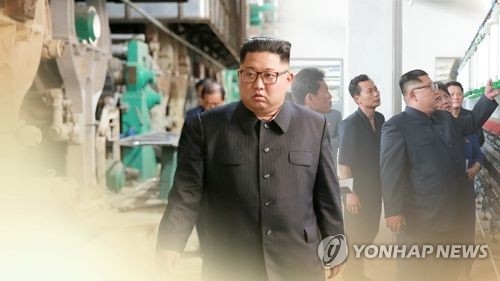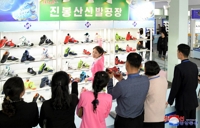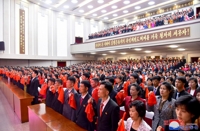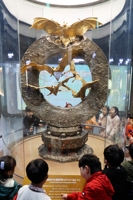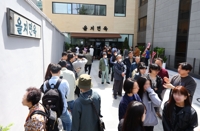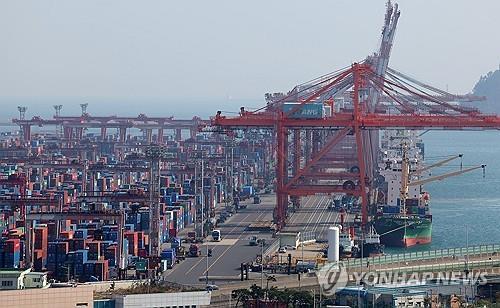(LEAD) N. Korea's economy shrinks 3.5 pct in 2017: BOK
(ATTN: ADDS details in last 6 paras)
SEOUL, July 20 (Yonhap) -- North Korea's economy contracted 3.5 percent on-year in 2017 in the aftermath of tougher international sanctions and drought, logging the worst showing in two decades, South Korea's central bank said Friday.
In 2017, the communist country's estimated gross domestic product (GDP) marked a sharp decline from 3.9 percent growth in the previous year to report the worst performance since 1997 when its economy retreated 6.5 percent, according to the report by the Bank of Korea (BOK).
Last year, the South Korean economy grew 3.1 percent from a year earlier.
"The negative growth is attributable to a drop in its mining output and a retreat in its heavy and chemical industries, as the United Nations imposed tougher sanctions over its nuclear and missile activities," said a BOK official, adding that unfavorable weather conditions hit the already fragile economy.
The sanctions call for a ban on the country's exports of coal and other mineral resources to cut off its access to hard currency.
Last year, the mining industry in North Korea tumbled 11 percent due to a drop in coal production, a sharp turnaround from a 8.4 percent growth in 2016. Its agricultural and fisheries output fell 1.3 percent on-year, according to the data.
The manufacturing sector also suffered a 6.9 percent decline, compared to a 4.8 percent increase in 2016. Though light industry inched up 0.1 percent, the heavy and chemical sectors sank 10.4 percent, the bank said.
The electricity, gas and tap water business shed 2.9 percent in 2017 due to a fall in hydroelectric power production, and the construction field posted a 4.4 percent decrease. But the service sector went up 0.5 percent.
The BOK put the North's gross national income (GNI) in 2017 at 36.6 trillion won ($32.2 billion), which is 2.1 percent of that of South Korea. Its per-capita GNI stood at 1.46 million won, which is 23-times less than the South's.
The communist country's trade volume stood at $5.55 billion last year, down 15 percent from a year earlier, the BOK said.
Exports tumbled 37.2 percent to $1.77 billion, while imports inched up 1.8 percent to $3.78 billion.
The volume of inter-Korean trade collapsed 99.7 percent on-year to log $900,000 in 2017, after the Seoul government shut down the joint industrial complex of Kaesong the previous year.
Such a downturn would continue well into this year, officials said, despite a recent thaw in relations between the North and the outside world.
"The U.N. imposed fresh sanctions against the North in August and December, and those will make a serious dent in the North Korean economy this year," another BOK official said, noting that the North's transactions with China have already tumbled "significantly" in the first half of this year.
North Korean leader Kim Jong-un, who took power in late 2011 after his father Kim Jong-il died, has pursued a "byungjin" policy of simultaneously pursuing nuclear and economic development.
In 2017, tensions on the Korean Peninsula soared because of North Korea's frequent missile launches and its sixth nuclear test.
Experts say tougher U.N. sanctions could take a huge toll on the North's moribund economy.
Since the beginning of this year, however, Kim appeared to have changed course and held two rounds of summits with South Korean President Moon Jae-in.
On June 12 in Singapore, U.S. President Donald Trump held an unprecedented summit with Kim and they pledged complete denuclearization of the Korean Peninsula.
Still, North Korea has not shown any signs of concrete action toward denuclearization and U.S. Secretary of State Mike has said that sanctions on North Korea will not be lifted until the North commits to getting rid of its nuclear weapons.
graceoh@yna.co.kr
(END)
-
 S. Korea marks 30th anniv. of Korean Pavilion at Venice Biennale with contemporary art
S. Korea marks 30th anniv. of Korean Pavilion at Venice Biennale with contemporary art -
 Artist Lee Bae captures ethereal Korean aesthetics at Venice Biennale
Artist Lee Bae captures ethereal Korean aesthetics at Venice Biennale -
 Ateez member Yunho throws first pitch at MLB match between Dodgers, Mets
Ateez member Yunho throws first pitch at MLB match between Dodgers, Mets -
 Gov't likely to accept university chiefs' request to lower med school enrollment quota
Gov't likely to accept university chiefs' request to lower med school enrollment quota -
 S. Korea supports resolution backing U.N. membership of Palestine
S. Korea supports resolution backing U.N. membership of Palestine
-
 Artist Lee Bae captures ethereal Korean aesthetics at Venice Biennale
Artist Lee Bae captures ethereal Korean aesthetics at Venice Biennale -
 S. Korea marks 30th anniv. of Korean Pavilion at Venice Biennale with contemporary art
S. Korea marks 30th anniv. of Korean Pavilion at Venice Biennale with contemporary art -
 Gov't likely to accept university chiefs' request to lower med school enrollment quota
Gov't likely to accept university chiefs' request to lower med school enrollment quota -
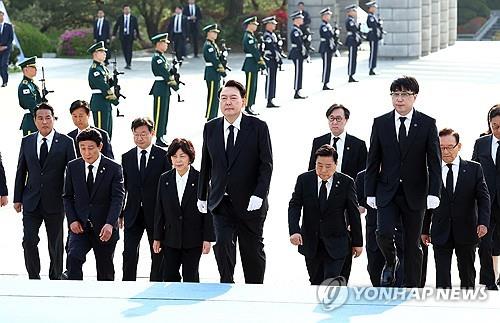 Yoon's approval rating sinks to lowest point since taking office
Yoon's approval rating sinks to lowest point since taking office -
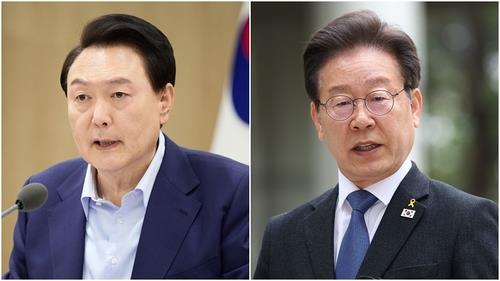 (LEAD) Yoon proposes first-ever meeting with opposition leader
(LEAD) Yoon proposes first-ever meeting with opposition leader
-
 Author of ADOR's 'internal document' refutes allegations of spinoff plot
Author of ADOR's 'internal document' refutes allegations of spinoff plot -
 N.K. leader's sister slams joint S. Korea-U.S. military drills
N.K. leader's sister slams joint S. Korea-U.S. military drills -
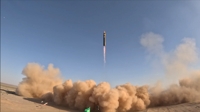 (LEAD) N. Korea sends economic delegation to Iran amid suspected military cooperation
(LEAD) N. Korea sends economic delegation to Iran amid suspected military cooperation -
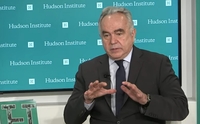 U.S. will take steps for three-way engagement on nuclear deterrence with S. Korea, Japan: Campbell
U.S. will take steps for three-way engagement on nuclear deterrence with S. Korea, Japan: Campbell -
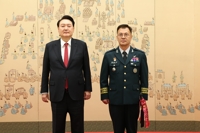 Yoon says N. Korea must not dare challenge S. Korea
Yoon says N. Korea must not dare challenge S. Korea
